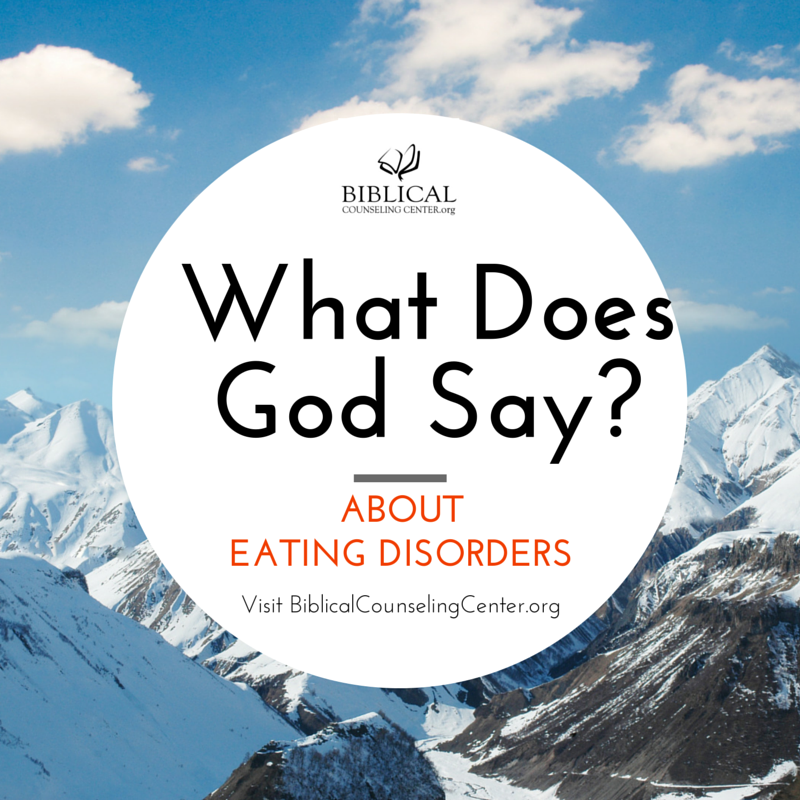“What Does God Say About Eating Disorders?” is the second post in Biblical Counseling Center’s new summer series “What Does God Say?” This series spotlights numerous issues that our counselees turn to us for compassionate and competent counseling in person and by Skype.
Among the “What Does God Say?” posts are marital abuse and rebellious kids to depression and anger to masturbation, adultery, and homosexuality. Here’s is “What Does God Say About Easting Disorders?” by guest blogger Hayley Satrom, a biblical counselor with HeartSong Counseling in Washington, D.C. This article (A Three-Pronged Team Approach When Caring for People with Eating Disorders by Hayley Satrom) originally appeared on the Biblical Counseling Coalition website and is used with permission.
How does biblical counseling help people with eating disorders? Do you or a friend need help and hope? Reach out. “What Does God Say? is our summer series on common problem our counselees have faced.
As a biblical counselor, I meet with many people whose lives, hearts, and minds are controlled by an obsession with food. Whether anorexia, bulimia, or binge-eating, disordered eating patterns are very common among my counselees, and I’ve found that often they need professional assistance beyond what I alone can provide.
Now, hear me out. I believe there are many counseling issues we biblical counselors can face without additional help from other trained medical professionals. That said, eating disorders, in my opinion, are simply not of that category. After working with many anorexic and bulimic individuals, I have come to respect, and indeed mandate, a team approach to their care.
A Three-Pronged Approach
It was actually my supervisor, Deepak Reju, who was the first to suggest I utilize what he called a “three-pronged approach” in caring for counselees with eating disorders. “What are these three prongs?” you ask. They are:
- Biblical counselor,
- Medical physician, and
- Nutritionist.
I now live by these three prongs when I counsel folks with eating disorders. The additional support has served me well as a counselor, and more importantly has served my counselees.
Why the Extra Help?
On our best days, I like to think of biblical counselors as “specialists” when it comes to unearthing and tackling h eart issues. We do this by God’s grace—through His Spirit, by His Word, and in His church. And please hear me that I am well aware that eating disorders are fraught with many heart issues: control, escape, body image distortion, anxiety, depression, distrust of God, confusion about God’s character, fear of man, and the list could go on and on. This list only begins to describe all the important themes that a biblical counselor can and should unpack with someone who struggles with an eating disorder.
eart issues. We do this by God’s grace—through His Spirit, by His Word, and in His church. And please hear me that I am well aware that eating disorders are fraught with many heart issues: control, escape, body image distortion, anxiety, depression, distrust of God, confusion about God’s character, fear of man, and the list could go on and on. This list only begins to describe all the important themes that a biblical counselor can and should unpack with someone who struggles with an eating disorder.
Is this enough, though? When a woman is abusing her physical body through either deprivation or binging of food, is processing heart issues the only help she needs? I can tell you that, from my experience, the answer is “No.”
In fact here are just a few of the ways a physician and nutritionist have come to my aid in counseling folks with eating disorders in the past:
Physician:
- Can tend to the innumerable health problems that are consequential to eating disorders (gastrointestinal disorders, heart problems, low blood sugar, fainting spells, etc.);
- Tests the body for important nutrients that may be low for someone abusing food (e.g. potassium, iron) and can prescribe supplements when needed;
- Will track the patient’s weight over time and can flag if the need for more intensive inpatient care is required;
- Can prescribe psychiatric medication if needed (or a psychiatrist could be used for this as well).
Nutritionist/Dietician:
- Manages everything food-related for the counselee;
- Creates meal plans for breakfast/lunch/dinner/snacks for a typical day and week;
- Provides specific accountability for food-related plans and goals;
- Conducts weekly weigh-ins (often blind to the patient) for the counselor and physician to refer to in monitoring the counselee’s progress.
As you can see, physicians and nutritionists can be of great help to the biblical counselor in caring for someone with an eating disorder. In fact, their support regarding the patient’s health and food needs allows a biblical counselor more freedom to spend the time in counseling appointments on what we do best—tending to the heart issues underneath the symptoms.
How Does the Three-Pronged Approach Work?
In practice, I try to meet weekly with counselees who are actively struggling with an eating disorder. I also suggest weekly meetings with their nutritionist for the sake of ongoing help in food-planning and accountability, as well as regular weigh-ins (which are particularly important for anorexic counselees whose health and even very life are at risk if their weight drops too low).
Physician appointments do not need to be so frequent, unless specified by the doctor. In general, I find it best to allow the physician to lead the conversation on how frequent the patient needs to see him or her. Frequency of visits will depend upon the specific health challenges that exist due to the eating disorder, which is different for every counselee, of course.
I think it is helpful to check in with the physician and nutritionist every month or so to share notes on the counselee and to discuss next steps in coordinating her care.
Linking Hands
As biblical counselors, we provide an invaluable service of helping others change by addressing the heart issues that underlie thoughts and behaviors. We try to lead people to Christ—to know Him, trust Him, and lean into Him for help with even the hardest struggles. This service is necessary and irreplaceable. That said, in some situations we can do more. In fact, in some situations we NEED to do more.
An eating disorder is one of those situations. Eating disorders can be dangerous with many physical health consequences. Let’s link hands with other experienced caregivers who can advise our counselees on certain matters better than even we can. By caring for our counselees’ souls, minds,and bodies, surely we will bring much glory to God.
Join the Conversation
- What are your convictions regarding biblical counselors engaging with other care-giving professionals?
- What else have you found to be helpful and effective as you care for individuals with eating disorders?
- Maybe you have even struggled with an eating disorder yourself. What advice would you give to caregivers?
Resourses for You from BCC
COUNSELING: Do you or a friend with struggle with eating disorders? We care. We want to help. Read about our effective counseling and ask any question your have.
SIGN UP: Get BCC’s blog resources. Easy, secure signup.








